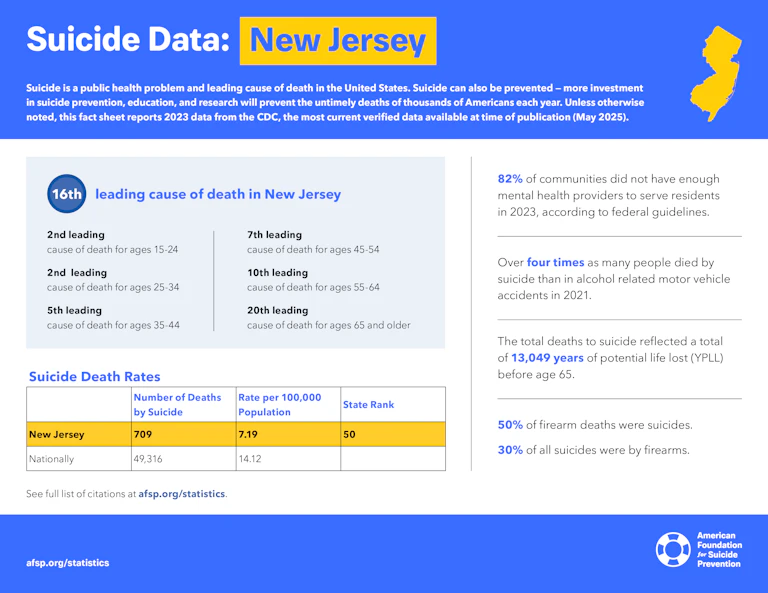New Jersey

New Jersey suicide prevention plans and initiatives
In 2004 New Jersey law established the Youth Suicide Prevention Advisory Council to advise and make recommendations to the state’s Department of Children and Families (DCF), the lead agency for youth suicide prevention in the state, on youth suicide reporting, prevention, and intervention (§ 30:9A-25). DCF provides staff support to the Council and in 2017 released the New Jersey Youth Suicide Report in collaboration with the state’s Department of Health (DOH). New Jersey law also charges DCF with developing and adopting a statewide youth suicide prevention plan, and in 2015 a collaborative effort with community partners and the Council resulted in the New Jersey Strategy for Youth Suicide Prevention (“Youth Plan”), a continuation of the original 2011-2014 plan.
In 2012 the New Jersey Department of Human Services, Division of Mental Health and Addiction Services (DMHAS) Suicide Prevention Committee began to review its own mental health and addiction assessment and treatment systems in relation to the recommendations included in the original “Youth Plan.” The result was the development of the New Jersey Department of Human Services Division of Mental Health and Addictions Services Adult Suicide Prevention Plan: 2014-2017, which contains strategies and actions in addition to crisis responses for the specific concerns related to adult suicide, going beyond organizations and agencies to include broad based community activism in preventing suicides. The Committee is responsible for implementing, monitoring, and evaluating the plan.
In 2019, in collaboration the New Jersey County Jail Warden’s Association, the state’s Department of Corrections announced a plan to address growing rates of suicide in county jails. These efforts include, but are not limited to, unannounced facility inspections, required annual suicide prevention training, and technical assistance to help counties develop prevention policies. These measures are in addition to county jails being required to conduct reviews of inmate suicide. In 2019, New Jersey also launched the United States first state level program to prevent police officer suicide, the New Jersey Resiliency Program for Law Enforcement. This program will work to address the increase in risk of suicide among law enforcement officers operating within the state. Officers will now be required to complete training in suicide prevention and will supplement existing employee assistance and counseling programs.
New Jersey laws
Key:
- Required by law
- Encouraged by law
- No law in place
Crisis lines and 988 implementation
- Addresses 988 infrastructure and provides for telecom user fee
- Addresses 988 infrastructure but does not include telecom user fee
- 988 law limited to creating an exploratory commission, advisory committee, or task force
Mental health parity
- Public health plans (e.g., Medicaid) regularly submit parity compliance analyses to state regulators
- Private health plans (individual and group) regularly submit parity compliance analyses to state regulators
K – 12 school suicide prevention
- Inclusion of the 988 Suicide & Crisis Lifeline and/or other crisis line(s) on student ID cards
- Student allowances for excused mental health absences
- School personnel must report student suicide risk to a parent and/or guardian
- Suicide prevention and/or mental health training for certain school personnel, annual
- Suicide prevention and/or mental health training for certain school personnel, not annual
- Suicide prevention, intervention, and postvention policies/programming
- Student education on suicide prevention
Health professional training in suicide assessment, treatment and management
- Mental health professionals receive regular training
- Mental health professionals receive one time training
- Medical/surgical professionals receive regular training
- Medical/surgical professionals receive one time training
Conversion therapy bans
- Prohibits licensed/board certified mental health providers from engaging in conversion therapy with minors under 18 years of age
- Prohibits licensed/board certified mental health providers from engaging in conversion therapy with vulnerable adults
- Prohibits use of state funds for any purpose related to conversion therapy (e.g., conducting, making a referral for, or extending health benefits coverage for)
University and college campus suicide prevention
- Inclusion of the 988 Suicide & Crisis Lifeline and/or other crisis line(s) on student ID cards
- Students receive information on available mental health and/or suicide prevention services and/or resources
- Adoption of suicide prevention/awareness policy or program
Firearms
- Process for extreme risk protection orders (ERPOs)
- State voluntary do not sell list